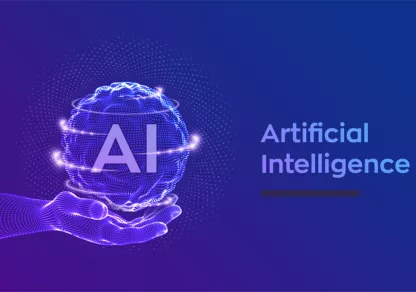The role of artificial intelligence in security
Artificial intelligence (AI) now plays a crucial role in many sectors, including cybersecurity. Cyberattacks are becoming increasingly complex, fast, and difficult to detect. In response to this reality, traditional solutions are showing their limitations. With ever more advanced cyber threats, AI helps anticipate risks and strengthen the security of information systems.
Thanks to technological advancements such as machine learning and deep learning, AI offers new possibilities for detecting and preventing attacks. This evolving capability is essential in the face of increasingly unpredictable cyber threats.

Why use AI?
AI significantly enhances protection against cyberattacks and reduces response time in the event of an incident. By integrating AI into their cybersecurity strategy, companies can detect threats more quickly and respond more effectively.
- According to a study by Accenture, organizations using AI in this field reduce the time needed to respond to security incidents by 12%.
- Deloitte reports that 63% of companies have already adopted AI in their cybersecurity strategy, while 26% plan to do so soon.
These figures confirm that AI is becoming a central element in the protection of information systems.
How AI Works in Cybersecurity
AI in cybersecurity operates by using machine learning algorithms to analyze data from various sources, such as system logs, network traffic, and user behavior. It learns from this data to identify patterns and detect anomalies that may indicate a potential threat. For example, a sudden increase in traffic to a specific server or unusual login attempts could signal an ongoing attack.
Use Cases
- Threat Detection: By analyzing large amounts of data, AI identifies suspicious behavior and anomalies that could indicate a cyberattack.
- Vulnerability Management: AI automates the search for security flaws in software and systems, allowing issues to be fixed before hackers can exploit them.
- Malware Analysis: AI helps understand how malicious software operates, improving protection and enabling faster response in case of an attack.
- Extended Detection and Response (XDR): XDR solutions use AI to collect and correlate security data from various sources, providing enhanced visibility and a more effective response to threats.
- User and Entity Behavior Analytics (UEBA): AI analyzes user behaviors (keystrokes, mouse movements, etc.) and entity activities to detect unusual patterns that may indicate a compromise or insider threat.
AI: A Driver of Efficiency and Responsiveness
AI enhances cybersecurity in multiple ways:
- Automated Response and Incident Management: AI enables an instant reaction to threats by isolating compromised endpoints or blocking suspicious traffic while automating incident responses. This reduces risks and ensures rapid and efficient cyberattack management.
- Optimization of Analysts’ Work: By filtering alerts and providing recommendations, AI simplifies the work of analysts, allowing them to focus on more complex, high-value issues.
- Threat Prediction and Detection: Through data analysis and machine learning, AI anticipates emerging threats, identifies abnormal behavior, and proactively detects cyber threats before they materialize.
- Automation of Repetitive Tasks: AI frees up time for human analysts by automating repetitive tasks, enabling them to focus on more complex and strategic challenges.

Defants AIR: AI at the heart of incident response
At Defants, we have fully integrated AI into our Defants AIR platform:
- Automated Reports: Say goodbye to long hours spent writing incident reports. Thanks to AI, report generation is fully automated, summarizing key information and streamlining communication between SOC and CERT teams. Reports are enriched with recommendations based on incident analysis, accelerating decision-making.
- Copilot, an AI Assistant: Inspired by conversational assistants like ChatGPT, Copilot supports analysts by providing real-time responses and insights. It helps speed up investigations and enables informed decision-making by suggesting appropriate corrective actions for each situation.
We have integrated AI into our Defants AIR platform. These tools help businesses enhance their protection while optimizing analysts’ work. We firmly believe that the future of cybersecurity relies on intelligent collaboration between AI and human experts.
AI will not replace human expertise but will enhance it by allowing SOC and CERT analysts to focus on critical tasks. With tools like Defants AIR, we empower businesses to strengthen their security and anticipate future threats.
AI: A Replacement for Cybersecurity Experts?
AI represents a major advancement, but it will never fully replace cybersecurity professionals. While it can speed up threat detection and response, it cannot make strategic decisions or solve complex problems like human experts. AI should be seen as a decision-support tool rather than a substitute for human skills.
Cybercriminals also leverage AI to create increasingly sophisticated attacks, making continuous technological monitoring essential.
What Are AI’s Limitations?
- False Positives and False Negatives: AI systems can sometimes generate false security alerts (false positives) or fail to detect certain attacks (false negatives).
- Targeted Attacks Against AI: Hackers can develop techniques specifically designed to deceive AI systems.
- Need for High-Quality Data: AI requires large amounts of quality data to learn and function effectively.
- Cost and Complexity: Implementing AI-based cybersecurity solutions can be expensive and complex.
Integrating AI into cybersecurity offers significant benefits, but it also presents challenges, particularly in terms of transparency, trust, and data protection.

AI and France
At the latest AI Summit, France reaffirmed its ambition to play a key role in the European artificial intelligence landscape. The country is committed to building a sovereign, ethical, and environmentally responsible AI, highlighting its strengths in the face of global competition.
An Ambitious French Strategy
- A European Leader Against Global Giants
France is positioning itself as a central player in shaping a European approach to AI, aiming to offer a credible alternative to solutions developed in the United States and China.
- Green and Responsible AI
Aware of environmental challenges, France is investing in low-carbon AI, relying on nuclear energy to power its digital infrastructure.
- A Strict Ethical Framework
Data protection and copyright compliance are at the heart of France’s strategy. A rigorous regulatory framework ensures that AI aligns with European values, particularly regarding the protection of minors.
- Strategic Investments
With a €109 billion financial commitment, France is demonstrating its determination to accelerate the growth of its AI ecosystem.
- The Creation of an AI Foundation
A dedicated research and innovation structure will be established, with the goal of raising €2.5 billion over five years, including €500 million by 2025.
- Lucie, the French Open-Source AI
This ambitious project aims to develop a sovereign AI that complies with European regulations, providing an alternative to American and Chinese solutions.
France: A Key Player in Global AI
Ranked 5th in the world for AI, ahead of Japan and Germany, France benefits from several major advantages:
✅ Cutting-edge research led by renowned experts and centers of excellence.
✅ A dynamic innovation ecosystem supported by a strong network of tech startups.
✅ Strong governmental support, with a clear roadmap for AI development and regulation.
A Future Shaped by Sovereign and Ethical AI
Artificial intelligence is a strategic priority for the coming years, and France is determined to be a key player. Through major investments, initiatives, and a vision focused on ethics and sovereignty, the country is positioning itself to shape the future of AI in Europe and beyond.
What Do You Think About AI’s Impact on Cybersecurity?



